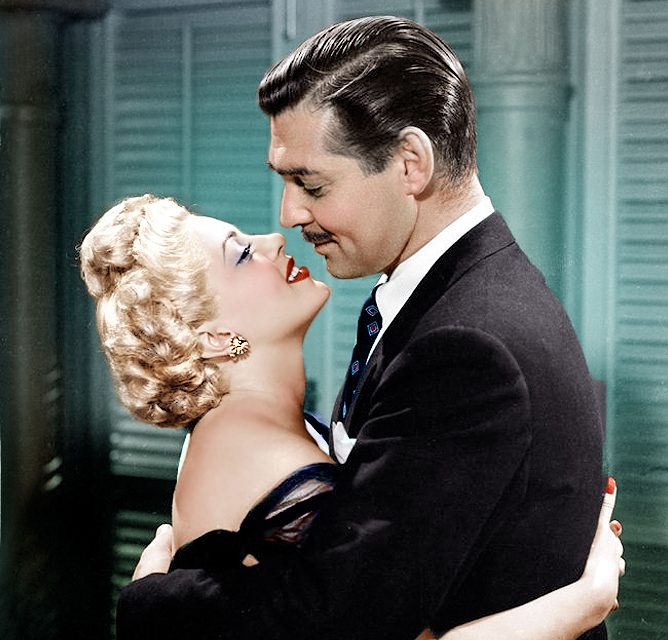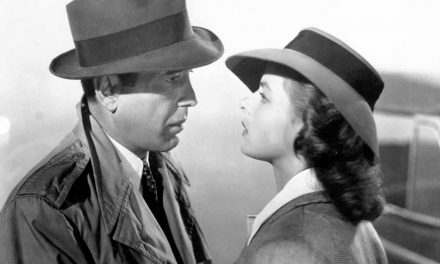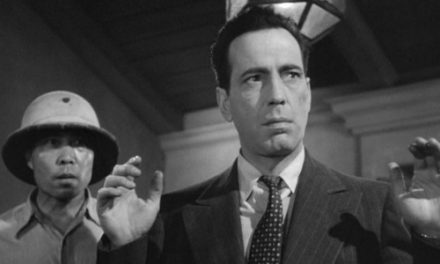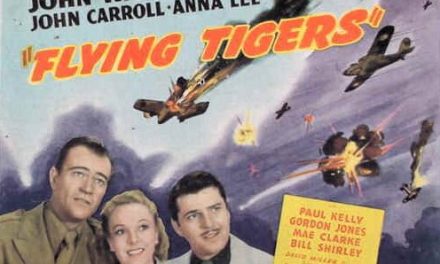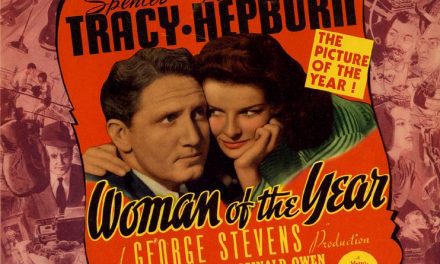The new film “Somewhere I’ll Find You,” starring Clark Gable and Lana Turner, begins on October 2, 1941, 64 days before the attacks on Pearl Harbor. Gable plays Jonny Davis, a newspaper journalist who works alongside his brother Kirk “Junior” Davis (Robert Sterling). Jonny and Junior have just returned from Europe, where they were reporting on the ongoing war. They were “kicked out” of Germany because they were going to report that Germany and Japan were planning to attack the U.S. in the near future.
Jonny and Junior write about this and trick their editor into publishing the piece. The editor is adamantly against running this pro-war piece in a currently neutral America. Immediately Jonny and Junior are seen as the protagonists in this film who have witnessed the truth about the German forces and their devious and evil intentions. Jonny and Junior are determined to reveal this knowledge to their readers. When they read the piece their friend, who serves as an example of the average American, becomes enraged by what he is hearing and has now changed his opinion on the war from neutral to believing the US should enter the war.
The editor is fearful that if this piece is published it will have this effect on all its readers and that will lead to pro-war feelings and cause an outcry and possibly negative attention to be brought to the paper from those in power. The editor is made to look like a coward because at the release of this film Americans were already involved in the war and had been exposed to the evils of the Germans and especially the Japanese.
Paula Lane, who is played by Lana Turner, is also a journalist at The Chronicle, where Jonny and Junior work. The film centers on the love triangle between Paula, Jonny and Junior. Junior is in love with Paula, Paula is in love with Jonny. Jonny, who initially wants to teach his brother a lesson about women being trouble, takes Paula out on a date. However, he unintentionally falls in love with Paula and becomes conflicted because of his brother’s feelings for her.
Paula feels conflicted by her feelings because although she likes Junior and considers his offer of marriage she cannot deny her stronger feelings for Jonny. Jonny and Paula act upon their feelings for each other yet it is clear that both are feeling conflicted because of Junior. Paula rejects Junior’s proposal and reveals to him her feelings for Jonny. This deeply upsets Junior and he warns her about Jonny’s philandering ways. Junior then confronts Jonny about Paula and this causes Jonny to pull away from Paula and causes her to leave for China to resume her reporting career.
The love triangle between Paula, Jonny and Junior seems to act as a metaphor for the U.S. feelings towards the war before Pearl Harbor. The idea of having to choose between what is the right choice and what is the easy choice is something these characters feel conflicted over. America during the time before Pearl Harbor also battled with this decision that entering the war is the right choice but certainly not the easy choice.
Paula tried to be with Junior. She could have had a safe and uneventful life with him. The U.S. tried to remain neutral concerning the war. It would have been the safe choice as well and would offer very few obstacles (at the outset) in keeping the U.S. out of immediate danger. Paula always knew that if she was being honest with herself the right choice for her would not be the easy choice and she could not deny her overwhelming feelings for Jonny. Jonny offered many obstacles and a lot of resistance for Paula yet the choice was out of her hands.
The U.S. knew eventually that entering the war would be inevitable. It was the right choice. Although entering the war would create a great many obstacles for the U.S. and the American people were reluctant towards entering another war the choice would soon be out of their hands.
Both Paula and Jonny’s as well as the U.S. decision were rendered moot because of the attacks on Pearl Harbor. After Pearl Harbor, Junior enlisted in the Army and Paula joins the Red Cross instead of running to Australia together to stay out of harm’s way. Again we see this internal battle within the characters between choosing between what is right and what is easy. Jonny became a frontline war reporter and runs into Junior on the battle field.
After the attacks on Pearl Harbor, the U.S. was no longer a bystander and was compelled to enter the war. The resistance from the American citizens was no longer a factor due to the lives lost from the horrific attack. They knew what needed to be done now and that any chance of remaining neutral was no longer an option.
“Somewhere I’ll Find You” ends with a message to purchase war bonds and stamps, which will provide money for the war effort. The stronger message of support comes just before that. While Jonny dictates his article covering the war, he claims victory for the U.S. and reveals that Jonny has been killed in the Battle of Bataan. When Paula finds Jonny and learns about Junior she begins to cry. Jonny comforts Paula but tells her to stop crying because Junior died a hero. Jonny then continues to dictate his article covering the battle and says if the Japanese have any differing opinion on who was victorious they better believe the there is “more to come.” These three final words show that this is only the beginning and the U.S. will prevail.

